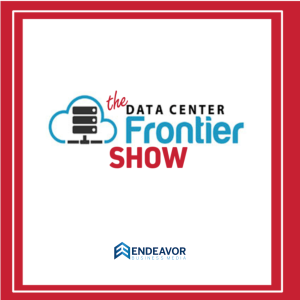
Tuesday Feb 13, 2024
The Top 5 Data Center Industry Stories of Q4
For this episode of the Data Center Frontier Show podcast, it's financial earnings call season, so Editor in Chief Matt Vincent and Senior Editor David Chernicoff take the opportunity to discuss DCF's top 5 most popular data center and cloud computing industry stories for the fourth quarter of 2023, which were as follows:
1. Dominion: Virginia’s Data Center Cluster Could Double in Size
Dominion Energy says it has customer contracts that could double the amount of data center capacity in Virginia by 2028 and is planning new power lines to support this growth. Virginia is already the world’s largest market for cloud computing infrastructure. Despite the current power constraints around Ashburn, the data center market in Virginia is positioned to grow much larger. The utility says it has received customer orders that could double the amount of data center capacity in Virginia by 2028, with a projected market size of 10 gigawatts by 2035. That represents a huge increase from current data center power use, which reached 2.67 gigawatts in 2022. The utility’s projections mean that Virginia will continue to experience tensions between the growth of the Internet and the infrastructure to support it. Data Center Frontier's Founder and Editor at Large, Rich Miller, reports.
2. Microsoft Unveils Custom-Designed Data Center AI Chips, Racks and Liquid Cooling
At Microsoft Ignite last November, the company unveiled two custom-designed chips and integrated systems resulting from a multi-step process for meticulously testing its homegrown silicon, the fruits of a method the company's engineers have been refining in secret for years, as revealed at its Source blog. The end goal is an Azure hardware system that offers maximum flexibility and can also be optimized for power, performance, sustainability or cost, said Rani Borkar, corporate vice president for Azure Hardware Systems and Infrastructure (AHSI). “Software is our core strength, but frankly, we are a systems company. At Microsoft we are co-designing and optimizing hardware and software together so that one plus one is greater than two,” Borkar said. “We have visibility into the entire stack, and silicon is just one of the ingredients.” The newly introduced Microsoft Azure Maia AI Accelerator chip is optimized for artificial intelligence (AI) tasks and generative AI. For its part, the Microsoft Azure Cobalt CPU is an Arm-based processor chip tailored to run general purpose compute workloads on the Microsoft Cloud. Microsoft said the new chips will begin to appear by early this year in its data centers, initially powering services such as Microsoft Copilot, an AI assistant, and its Azure OpenAI Service. They will join a widening range of products from the company's industry partners geared toward customers eager to take advantage of the latest cloud and AI technology breakthroughs.
3. The Eight Trends That Will Shape the Data Center Industry in 2023
Rich Miller predicted that 2023 would be a year of dueling cross currents that could constrain or accelerate business activity in the sector. DCF's Vincent and Chernicoff briefly review last year's trends, remarking on how so many of them are still in full effect for the industry right now.
Scorecard: Looking Back at Data Center Frontier’s 2023 Industry Predictions
4. Google Is Now Reducing Data Center Energy Use During Local Power Emergencies
Last October, Google shared details of a system optimized to reduce the energy use of data centers when there is a local power emergency. Core functions of the system, which has the hallmarks of a universally applicable technology, include postponing low-priority workloads, and moving others to other regions that are less constrained. Regarding the system, Michael Terrell, Google's Senior Director for Energy and Climate, explained in a LinkedIn post how the new demand response capability can temporarily reduce power consumption from Google data centers when it’s needed, and provide flexibility to the local grids that power its data center operations. Demand response helps grid operators serve their customers reliably during times of need, such as in times of supply constraints or extreme weather events. Terrell's post empasized that "demand response can be a big tool to help grids run more cost-effectively and efficiently, and it can accelerate system-wide grid decarbonization." Google’s Climate and Energy teams created the new system, which Terrell called an important development toward running the company's data centers "intelligently, efficiently and carbon-free."
5. Cloudflare Outage: There’s Plenty Of Blame To Go Around
The Cloudflare outage in the first week of November drew quite a bit of attention, not only because Cloudflare’s services are extremely popular, so their failure was quickly noticed, but also because of the rapid explanation of the problem posted in the Cloudflare Blog shortly after the incident. This explanation placed a significant portion of the blame squarely on Flexential and their response to the issues with electricity provider PGE, and potential issues that PGE was having. Cloudflare was able to restore most of its services in 8 hours at its disaster recovery facility. It runs its primary services at three data centers in the Hillsboro, Oregon area, geolocated in such a way that natural disasters are unlikely to impact more than a single data center. DCF's David Chernicoff noted, "While almost all of the coverage of this incident starts off by focusing on the problems that might have been caused by Flexential, I find that I have to agree with the assessment of Cloudflare CEO Matthew Prince: To start, this never should have happened.”
Here are links to some related DCF articles:
- DCF Show: Data Center Frontier's Rich Miller Returns For a Visit
- DCF Tours: Flexential Dallas-Plano Data Center, 18 MW Colocation Facility
- Meta Previews New Data Center Design for an AI-Powered Future
- For Leading Cloud Platforms, AI Presents a Major Opportunity
- AI Propels Cloud Growth, Digital Infrastructure Investment to New Heights
No comments yet. Be the first to say something!